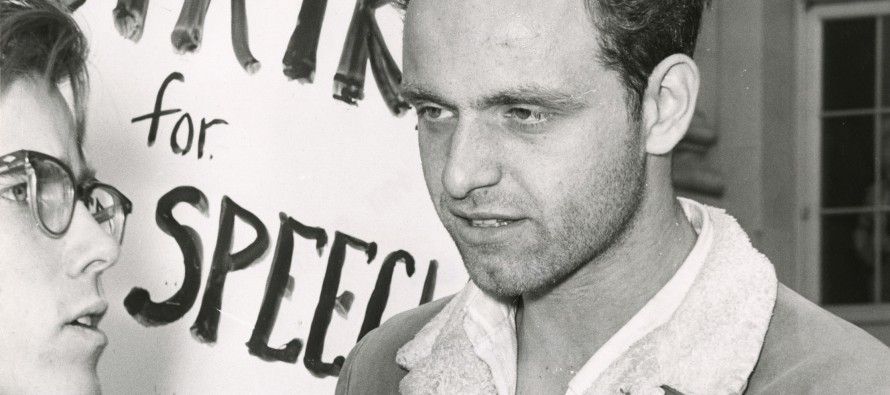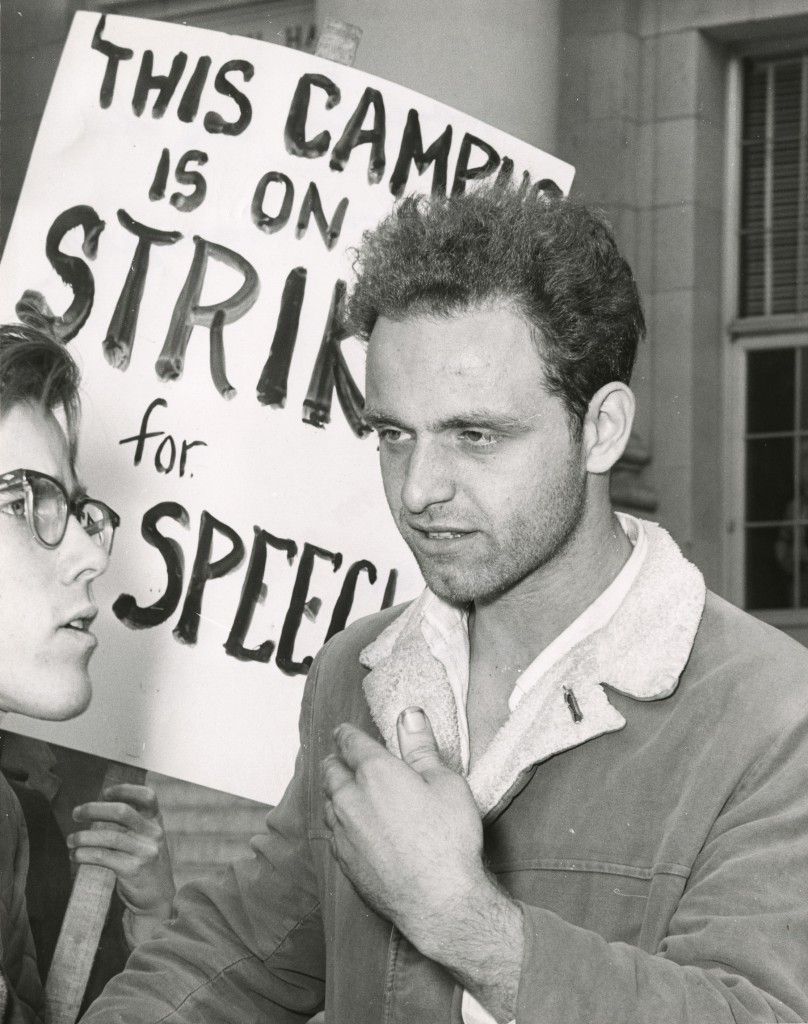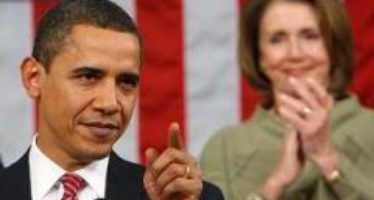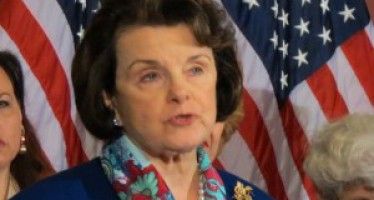50 years after the Berkeley Free Speech Movement

 It’s been 50 years today since Mario Savio gave his “put your bodies upon the gears” speech at the University of California, Berkeley, the best remembered part of the Free Speech Movement. He attacked the university administration for running the school like a machine, with the students the product:
It’s been 50 years today since Mario Savio gave his “put your bodies upon the gears” speech at the University of California, Berkeley, the best remembered part of the Free Speech Movement. He attacked the university administration for running the school like a machine, with the students the product:
“There’s a time when the operation of the machine becomes so odious, makes you so sick at heart, that you can’t take part! You can’t even passively take part! And you’ve got to put your bodies upon the gears and upon the wheels…upon the levers, upon all the apparatus, and you’ve got to make it stop! And you’ve got to indicate to the people who run it, to the people who own it, that unless you’re free, the machine will be prevented from working at all!”
Savio was a liberal attacking UC President Clark Kerr’s “megaversity” for being a soul-destroying monster. But consevatives also attacked the massive campuses for their inhumanity. Conservative philosopher Russell Kirk branded them “Behemoth U” in such books as, from 1978, “Decadence and Renewal in the Higher Learning: An Episodic History of American University and College Since 1953.”
The Free Speech Movement quickly spread across the U.C. system, then the rest of the country. According to one account:
“Lasting a little over two months, it ended with the arrest of 773 persons for occupying the administration building, the removal of the campus administration, and a vast enlargement of student rights to use the University campus for political activity and debate. In the longer term it contributed to the election of Ronald Reagan as Governor of California in 1966, and the firing of University President Clark Kerr the following January.”
Dec. 2, 1964
On the Free Speech Movement’s actions on the day in question:
“The FSM told students to bring their sleeping bags to a noon rally on Wednesday, December 2. After a spirited rally, featuring famed folk-singer Joan Baez, about 2000 people once again occupied the Administration building. In the middle of the night Governor Brown told the police to clear the building. Arrests started at 3:00 a.m, and took 12 hours. Although the newspapers reported that 801 had been arrested, the process was so muddled that no one knew for weeks that it was only 773, including 735 students. They were collectively known to as “the 800.”
“A student strike began while the building was being cleared. Faculty raised bail money and drove to the various detention centers to bring the students home. Multiple meetings were held over the weekend by everyone involved — except the Chancellor, who was hospitalized. President Kerr canceled classes for Monday to hold a University meeting, where his newly formed committee of department chairmen would read what Kerr hoped were acceptable terms to end the conflict. While offering amnesty for violations of the old rules during the prior two months, they did not enlarge what the Regents had agreed to two weeks earlier.”
The Free Speech Movement also was dubbed the “dirty speech movement” because it was the first time profanity became common in protests, as it soon would in movies, on records and eventually on TV.
Still, things might have evened out. But a couple months later, on Feb. 9, 1965, ultra-liberal Democratic President Johnson sent the first U.S. combat troops to Vietnam. Millions of American boys were drafted and sent off to war. From then on, the campus protests centered on stopping the war, with such chants as, “Hey, hey, LBJ, how many kids did you kill today?”
Here’s Ronald Reagan running for governor in 1966:
Political Correctness
Free speech did flourish on campus for about 20 years. But in the mid-1980s, Political Correctness took hold and began stamping out free speech and academic freedom.
Just in October this year, Scripps College “disinvited” well-known conservative columnist and TV commentator George Will. The Claremont Independent reported:
“Nationally syndicated columnist George Will was slated to speak at the ninth annual Elizabeth Hubert Malott Public Affairs Program, the mission of which is to bring speakers to campus whose political views differ from the majority of students at the all-women’s college, but had his invitation rescinded after he wrote a columnabout sexual assault on college campuses.
“’It was in the works and then it wasn’t in the works,’ Will said in an interview with the Independent. ‘They didn’t say that the column was the reason, but it was the reason.
“Will also told the Independent that Christopher DeMuth, former president of the American Enterprise Institute, one of the most influential conservative think tanks in the country, resigned from his position on the program’s speaker selection committee over the decision to revoke the invitation.”
Nowadays there’s about as much freedom on American campuses as at Moscow U. in 1939.
It came out later that the FBI perpetually spied on Savio, even though he never was a national security threat, much as it did Dr. Martin Luther King Jr. and other peaceful 1960s activists.
Savio died of heart problems in 1996. But I don’t think he would be surprised that the repressive, anti-free speech U.C. of today is headed by the former boss of the American Committee for State Security, Janet Reno. She is demanding massive increases in tuition, even as the school’s administrators now now number more than professors, compared to less than half just 20 years ago.
P.C. all the way
Many of these administrators enforce P.C. anti-speech repression. As Heather Mac Donald reported in City Journal:
“‘Not only have diversity sinecures been protected from budget cuts, their numbers are actually growing. The University of California at San Diego, for example, is creating a new full-time “vice chancellor for equity, diversity, and inclusion.’ This position would augment UC San Diego’s already massive diversity apparatus, which includes the Chancellor’s Diversity Office, the associate vice chancellor for faculty equity, the assistant vice chancellor for diversity, the faculty equity advisors, the graduate diversity coordinators, the staff diversity liaison, the undergraduate student diversity liaison, the graduate student diversity liaison, the chief diversity officer, the director of development for diversity initiatives, the Office of Academic Diversity and Equal Opportunity….
“The main purpose of the UC Berkeley Initiative for Equity, Diversity and Inclusion seems to be to buy for the academic identity racket the respectability that no amount of campus mau-mauing has yet been able to achieve….
“UCLA’s diversity infrastructure has likewise been spared the budgetary ax. In the pre-recession 2005–06 academic year, UCLA’s associate vice chancellor for faculty diversity reported up the bureaucratic ladder to a vice chancellor for academic personnel, herself reporting to an executive vice chancellor and provost, who in turn reported to the university chancellor. Today, that associate vice chancellor for faculty diversity has been transformed into a vice provost position, while the vice chancellor for academic personnel above her has been eliminated.”
Free tuition?
For you youngsters reading this, you’ll be shocked to know that, in Savio’s day, the U.C. and Cal State and community college systems charged no tuition and no fees. The only way you could run up college debt was by partying down on Mom’s credit card.
The assault on free speech and academic freedom through the imposition of all those P.C. administrative positions has a cost — which you’ll be paying for all your life, with interest, on your college debt.
Related Articles
First CalWatchdog Caption Contest!
We have been rendered speechless. Words escape us. Help CalWatchdog caption this photo of our colleagues, taken in the CalWatchdog
Obama’s Thanksgiving turkey: 3,145 new regulations
As if the California Legislature passing nearly 1,000 new bills a year were not enough. President Obama’s White House just released
Congress still divided on how to address CA drought
California’s leaders have faced sharp criticism over their perceived failure to prepare the state for the current severe drought. But




